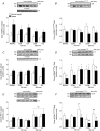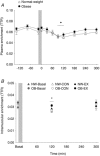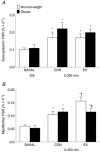Altered anabolic signalling and reduced stimulation of myofibrillar protein synthesis after feeding and resistance exercise in people with obesity
- PMID: 30113718
- PMCID: PMC6209748
- DOI: 10.1113/JP276210
Altered anabolic signalling and reduced stimulation of myofibrillar protein synthesis after feeding and resistance exercise in people with obesity
Abstract
Key points: Lifestyle modifications that include the regular performance of exercise are probably important for counteracting the negative consequences of obesity on postprandial myofibrillar protein synthetic responses to protein dense food ingestion. We show that the interactive effect of resistance exercise and feeding on the stimulation of myofibrillar protein synthesis rates is diminished with obesity compared to normal weight adults. The blunted myofibrillar protein synthetic response with resistance exercise in people with obesity may be underpinned by alterations in muscle anabolic signalling phosphorylation (p70S6K and 4E-BP1). The results obtained in the present study suggest that further exercise prescription manipulation may be necessary to optimize post-exercise myofibrillar protein synthesis rates in adults with obesity.
Abstract: We aimed to determine whether obesity alters muscle anabolic and inflammatory signalling phosphorylation and also muscle protein synthesis within the myofibrillar (MYO) and sarcoplasmic (SARC) protein fractions after resistance exercise. Nine normal weight (NW) (21 ± 1 years, body mass index 22 ± 1 kg m-2 ) and nine obese (OB) (22 ± 1 years, body mass index 36 ± 2 kg m-2 ) adults received l-[ring-13 C6 ]phenylalanine infusions with blood and muscle sampling at basal and fed-state of the exercise (EX) and non-exercise (CON) legs. Participants performed unilateral leg extensions and consumed pork (36 g of protein) immediately after exercise. Basal muscle Toll-like receptor 4 (TLR4) protein was similar between OB and NW groups (P > 0.05) but increased at 300 min after pork ingestion only in the OB group (P = 0.03). Resistance exercise reduced TLR4 protein in the OB group at 300 min (EX vs. CON leg in OB: P = 0.04). Pork ingestion increased p70S6K phosphorylation at 300 min in CON and EX of the OB and NW groups (P > 0.05), although the response was lower in the EX leg of OB vs. NW at 300 min (P = 0.05). Basal MYO was similar between the NW and OB groups (P > 0.05) and was stimulated by pork ingestion in the EX and CON legs in both groups (Δ from basal NW: CON 0.04 ± 0.01% h-1 ; EX 0.10 ± 0.02% h-1 ; OB: CON 0.06 ± 0.01% h-1 ; EX 0.06 ± 0.01% h-1 ; P < 0.05). MYO was more strongly stimulated in the EX vs. CON legs in NW (P = 0.02) but not OB (P = 0.26). SARC was feeding sensitive but not further potentiated by resistance exercise in both groups. Our results suggest that obesity may attenuate the effectiveness of resistance exercise to augment fed-state MYO.
Keywords: TLR4; inflammation; leucine; mTORC1; muscle mass; strength training.
© 2018 The Authors. The Journal of Physiology © 2018 The Physiological Society.
Figures






Comment in
-
When bigger isn't better: understanding the anabolic resistance of obese skeletal muscle.J Physiol. 2019 Apr;597(8):2129-2130. doi: 10.1113/JP277805. Epub 2019 Mar 18. J Physiol. 2019. PMID: 30835830 Free PMC article. No abstract available.
References
-
- Abou Sawan S, van Vliet S, Parel JT, Beals JW, Mazzulla M, West DWD, Philp A, Li Z, Paluska SA, Burd NA & Moore DR (2018). Translocation and protein complex co‐localization of mTOR is associated with postprandial myofibrillar protein synthesis at rest and after endurance exercise. Physiol Rep 6, e13628. - PMC - PubMed
-
- ACSM (2009). American College of Sports Medicine position stand. Progression models in resistance training for healthy adults. Med Sci Sports Exerc 41, 687–708. - PubMed
-
- Bagheri M, Farzadfar F, Qi L, Yekaninejad MS, Chamari M, Zeleznik OA, Kalantar Z, Ebrahimi Z, Sheidaie A, Koletzko B, Uhl O & Djazayery A (2018). Obesity‐related metabolomic profiles and discrimination of metabolically unhealthy obesity. J Proteome Res 17, 1452–1462. - PubMed
-
- Beals JW, Mackenzie RWA, van Vliet S, Skinner SK, Pagni BA, Niemiro GM, Ulanov AV, Li Z, Dilger AC, Paluska SA, De Lisio M & Burd NA (2017). Protein‐rich food ingestion stimulates mitochondrial protein synthesis in sedentary young adults of different BMIs. J Clin Endocrinol Metab 102, 3415–3424. - PubMed
Publication types
MeSH terms
Substances
Grants and funding
LinkOut - more resources
Full Text Sources
Other Literature Sources
Medical
Miscellaneous

